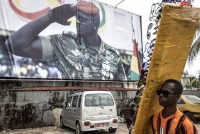
28 September massacre in Guinea: evaluating the trial one year on
On 28 September 2009, when opponents gathered peacefully in the stadium of Guinea’s capital Conakry to demonstrate against the presidential candidacy of Captain Moussa Dadis Camara, the security forces brutally repressed the gathering. Among other abuses, 156 people were killed, 109 women were raped and sexually assaulted. The trial for these crimes did not start in Guinea until 13 years later, on 28 September 2022, involving former military and government officials of the then junta, the National Council for Democracy and Development (CNDD).
The decision to hold the trial was taken in July 2022, two months before it was due to begin, by Colonel Mamady Doumbouya, the country's new strongman who overthrew President Alpha Condé in a coup d'état on 5 September 2021.… Seguir leyendo »



